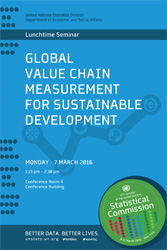United Nations Statistical Commission
47th Session (2016) Side Events
Lunchtime Seminar
Global Value Chain Measurement for Sustainable Development
- Monday, 7 MAR 2016
- 1:15 - 2:30pm
- Conference Room 4 (CB)
Meeting organized by UNSD
Global value chains (GVCs) are playing an increasingly important role in business strategies regarding the broad stages of production from upstream research and design, through manufacturing, to downstream logistics, marketing and sales. From the policy makers' perspective it is not enough to attract lead firms of global value chains in the goods and services producing sectors of their countries for generating income, jobs and investments. The policy challenge extends to creating and strengthening linkages with domestic firms and to ensuring that the host nation benefits from technology transfers, knowledge spill-overs, and increased value addition generated in the country.
For instance, firms from developing countries can establish themselves in apparel value chains through labor-intensive functions of relatively low knowledge intensity. Upgrading in the textiles and apparel value chain depends on a firm's capacity to master services which are integral to the efficient functioning of the value chain, for example in taking on the activities related to transport and logistics, design, branding, advertising and retailing of the products.
The GVC approach has now been recognised by the statistical community as the preferred way of measuring the interconnectedness of economies. In a GVC, many of the tasks are "offshored", either through an enterprise's own affiliates located in foreign countries or through independent contractors and suppliers of goods and services. This focus on GVCs has important implications for the statistical unit of measurement and related data collection and estimation procedures. In particular, the role of the lead firms and the global and regional fragmentation of production across countries included in the value chain for the various GVCs need to be better understood. This understanding can only be realised through collaboration between countries and between counties and international agencies and the standardization of the extended supply and use table and related integrated economic accounts.
This side event will reflect on a new global programme of work on the measurement of trade and globalization for which the collaboration between countries and international agencies is essential. The side event will address the policy questions, the general statistical framework based on GVC related extended national supply and use tables and integrated accounts, the supporting integrated set of business and trade statistics with focus on firm heterogeneity, the new globalisation aggregates and indicators and extensions to the national business registers and creation of global business register. Particular consideration will be given to the measurement of a number of important GVCs, such as the automotive, apparel and pharmaceutical sectors through extended national supply and use tables and their use in global multi-regional input output tables.
- Hubert Escaith, Chief Statistician, World Trade Organization
- Ronald Jansen / Ivo Havinga, Assistant Directors, United Nations Statistics Division
- Klaus Tilmes, Director of Trade and Competitiveness Global Practice, World Bank
- Walter Radermacher, Chief Statistician, European Union
- Rana Hasan, Director of Development Economics and Indicators Division, Asian Development Bank
